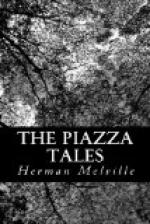“Because they have no memory,” he dejectedly replied; “because they are not human.”
“But these mild trades that now fan your cheek, do they not come with a human-like healing to you? Warm friends, steadfast friends are the trades.”
“With their steadfastness they but waft me to my tomb, Senor,” was the foreboding response.
“You are saved,” cried Captain Delano, more and more astonished and pained; “you are saved: what has cast such a shadow upon you?”
“The negro.”
There was silence, while the moody man sat, slowly and unconsciously gathering his mantle about him, as if it were a pall.
There was no more conversation that day.
But if the Spaniard’s melancholy sometimes ended in muteness upon topics like the above, there were others upon which he never spoke at all; on which, indeed, all his old reserves were piled. Pass over the worst, and, only to elucidate let an item or two of these be cited. The dress, so precise and costly, worn by him on the day whose events have been narrated, had not willingly been put on. And that silver-mounted sword, apparent symbol of despotic command, was not, indeed, a sword, but the ghost of one. The scabbard, artificially stiffened, was empty.
As for the black—whose brain, not body, had schemed and led the revolt, with the plot—his slight frame, inadequate to that which it held, had at once yielded to the superior muscular strength of his captor, in the boat. Seeing all was over, he uttered no sound, and could not be forced to. His aspect seemed to say, since I cannot do deeds, I will not speak words. Put in irons in the hold, with the rest, he was carried to Lima. During the passage, Don Benito did not visit him. Nor then, nor at any time after, would he look at him. Before the tribunal he refused. When pressed by the judges he fainted. On the testimony of the sailors alone rested the legal identity of Babo.
Some months after, dragged to the gibbet at the tail of a mule, the black met his voiceless end. The body was burned to ashes; but for many days, the head, that hive of subtlety, fixed on a pole in the Plaza, met, unabashed, the gaze of the whites; and across the Plaza looked towards St. Bartholomew’s church, in whose vaults slept then, as now, the recovered bones of Aranda: and across the Rimac bridge looked towards the monastery, on Mount Agonia without; where, three months after being dismissed by the court, Benito Cereno, borne on the bier, did, indeed, follow his leader.




